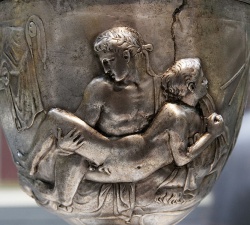Ancient Rome: Difference between revisions
No edit summary |
No edit summary |
||
| Line 1: | Line 1: | ||
{{stub}} | {{stub}} | ||
[[Image:Warren Cup Scene B 20thCentury london British Museum.jpg|250 px|right]] | [[Image:Warren Cup Scene B 20thCentury london British Museum.jpg|250 px|right]] | ||
Unlike the Greeks, Romans never institutionalized [[pederasty]]. <ref Name=”Percy”>Percy, William A. Pederasty and Pedagogy in Archaic Greece. University of Illinois Press, 1996. CHAPTER VI ISBN 0252067401 </ref> Man-boy relationships were driven primarily by lustful sex, and there was no educating or civil pursuit involved. Furthermore, whereas the Greek [[erastes]] was charged with protecting the young [[eromenos]], no such obligation existed in Rome.<ref>http://www.thinkaboutit-knowaboutit.com/2013/03/an-objective-history-of-pederasty.html</ref> Roman boylove though influenced by the Greeks slaves brought to Rome often was as violent and brutal as the Romans themselves. The Romans tended to value sexual conquest above romance and love. Pederasty came in and out of fashion during different periods of both the republic and the empire. Roman patricians frequently condemned the practice of [[Greek love]] publicly while privately complaining that “a pretty boy cost more than a plot of land ….” <ref> Polybius (31.25) </ref> Many politicians and other affluent and influential Romans often kept young slave boys as lovers. Much romantic poetry written by older men to | Unlike the Greeks, Romans never institutionalized [[pederasty]]. <ref Name=”Percy”>Percy, William A. Pederasty and Pedagogy in Archaic Greece. University of Illinois Press, 1996. CHAPTER VI ISBN 0252067401 </ref> Man-boy relationships were driven primarily by lustful sex, and there was no educating or civil pursuit involved. Furthermore, whereas the Greek [[erastes]] was charged with protecting the young [[eromenos]], no such obligation existed in Rome.<ref>http://www.thinkaboutit-knowaboutit.com/2013/03/an-objective-history-of-pederasty.html</ref> Roman boylove though influenced by the Greeks slaves brought to Rome often was as violent and brutal as the Romans themselves. The Romans tended to value sexual conquest above romance and love. Pederasty came in and out of fashion during different periods of both the republic and the empire. Roman patricians frequently condemned the practice of [[Greek love]] publicly while privately complaining that “a pretty boy cost more than a plot of land ….” <ref> Polybius (31.25) </ref> Many politicians and other affluent and influential Romans often kept young slave boys as lovers. Much romantic poetry written by older men to the boys who's beauty they admired last to this day from the Roman world from around the time of [[Roman Emperors|Augustus]] <ref>http://www.matthewnederlanden.com/bible-commentary/jesus-heals-the-centurion-matthew-8.php</ref> | ||
{{clr}} | {{clr}} | ||
Revision as of 12:58, 23 November 2013
This article is a fledgling. Help BoyWiki grow by expanding it |

Unlike the Greeks, Romans never institutionalized pederasty. [1] Man-boy relationships were driven primarily by lustful sex, and there was no educating or civil pursuit involved. Furthermore, whereas the Greek erastes was charged with protecting the young eromenos, no such obligation existed in Rome.[2] Roman boylove though influenced by the Greeks slaves brought to Rome often was as violent and brutal as the Romans themselves. The Romans tended to value sexual conquest above romance and love. Pederasty came in and out of fashion during different periods of both the republic and the empire. Roman patricians frequently condemned the practice of Greek love publicly while privately complaining that “a pretty boy cost more than a plot of land ….” [3] Many politicians and other affluent and influential Romans often kept young slave boys as lovers. Much romantic poetry written by older men to the boys who's beauty they admired last to this day from the Roman world from around the time of Augustus [4]
References
- ↑ Percy, William A. Pederasty and Pedagogy in Archaic Greece. University of Illinois Press, 1996. CHAPTER VI ISBN 0252067401
- ↑ http://www.thinkaboutit-knowaboutit.com/2013/03/an-objective-history-of-pederasty.html
- ↑ Polybius (31.25)
- ↑ http://www.matthewnederlanden.com/bible-commentary/jesus-heals-the-centurion-matthew-8.php